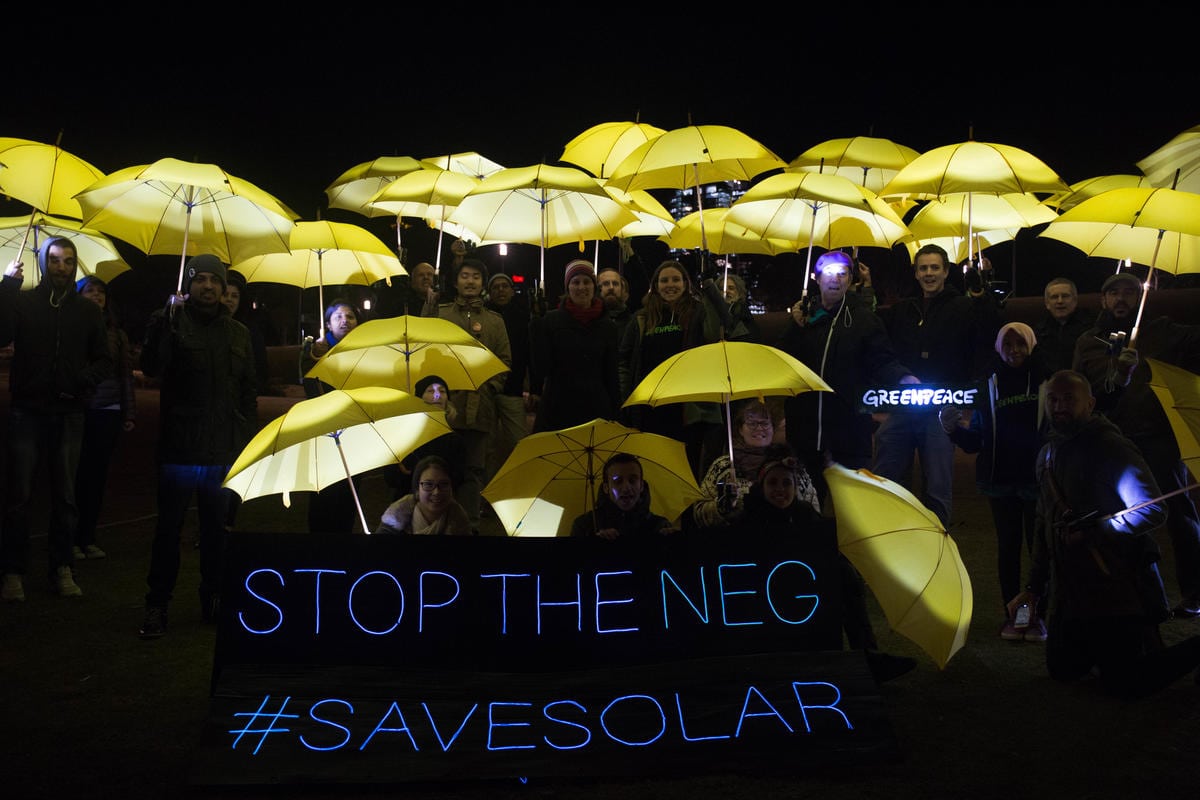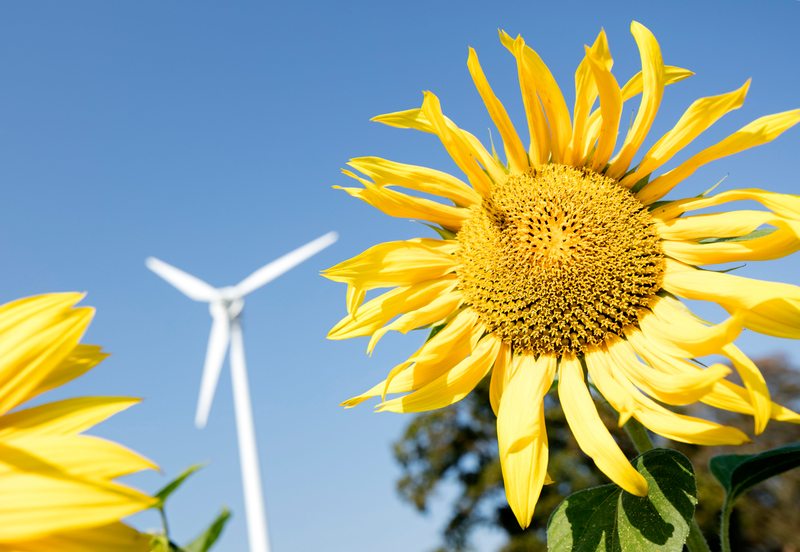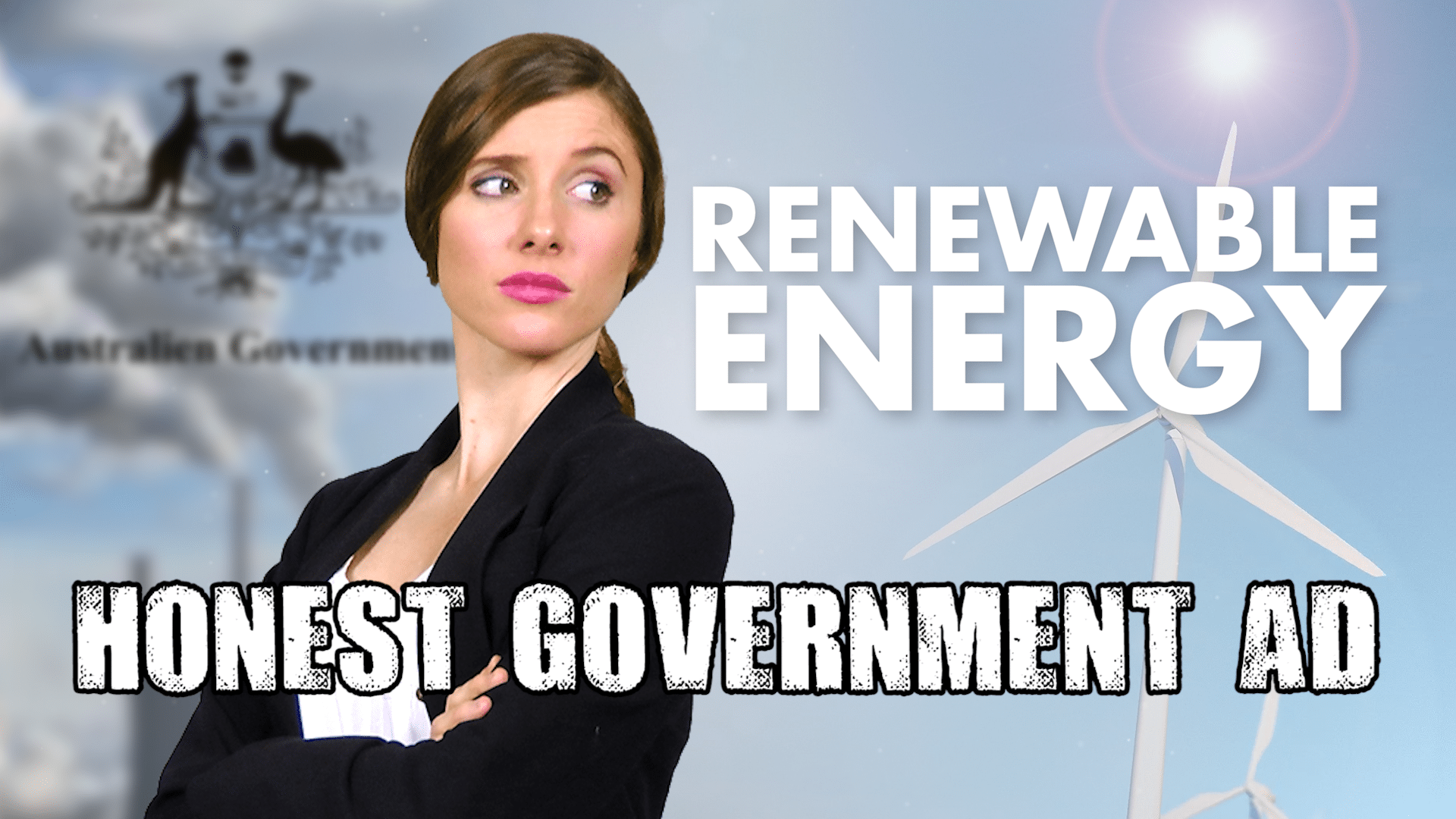When Greenpeace launched its campaign to protect renewables by urging the states reject the National Energy Guarantee (NEG), the chances of victory seemed slim.

The federal government and the Coalition-governed states appeared to be united behind this do-nothing policy, and to a certain extent, even their Labor counterparts looked like reluctant supporters.
Well, it didn’t take long for that house of cards to come spectacularly crashing down. Last month when Greenpeace launched a crowdfunder to air TV ads warning of the NEG’s threat to renewables, the rabid right of the Coalition sprung into action.
Even before the ads had aired, the climate change denialist Senator and Minister for Resources and Northern Australia Matt Canavan, had denounced them. Fortunately, the senator did it in a bizarre and nonsensical way that failed to make an impact beyond equally denialist publications like The Australian. Still, the reaction told us we were onto something.
Just a few days after launching the crowdfunder, thanks to the generosity of our supporters we had raised more than $54,000, enough to cover all the costs of producing our ad and putting it to air in the battleground states of Victoria and Queensland. At the same time, thousands of our supporters around the country emailed and phoned their state energy ministers, telling them to protect renewables and reject the NEG.
Late last month we stepped up our lobbying of the key players, armed with the credibility that comes with a comprehensive report on the the NEG’s impact on emissions and power prices. It was doubly authoritative because we used the same firm that the federal government itself uses for such modelling.
Our report not only confirmed that the NEG was garbage on emissions, but also revealed that a 45 percent target, as opposed to the government’s 26 percent target, would actually reduce power prices by a quarter. Labor’s Shadow Minister for Climate Change and Energy Mark Butler liked it so much the report became his proof that more renewables leads to lower prices, and emboldened him to make the case for more ambitious climate action.
The report also raised questions about the dodgy modelling that Prime Minister Malcolm Turnbull and his energy minister Josh Frydenberg had used to justify their claim that the NEG would reduce prices. We did some digging and found the modelling doesn’t exist, the government was just plucking numbers out of thin air and having them regurgitated by an uncritical media. It was sad that when the Senate forced the government to reveal their deception the public narrative had again shifted, with the focus on the concessions a weak and embattled leader was making to get the NEG through his divided party room.
We also published widely reported on polling, that showed the depth of public support for renewables, acceptance of the inevitability of a renewables-dominated energy system and Australians’ overwhelming desire for the government to invest in clean energy over coal.
The combination of all these tactics piled the pressure on the states to reject the NEG, and they duly complied with Victoria announcing four conditions it required to support the policy in the lead up to what loomed as a crucial August 10, COAG meeting.
While the demands were moderate and reasonable, there’s no reasoning with the coal huggers in the Coalition. Turnbull was now ensnared in a trap, where any concessions to make the NEG more attractive to the states would made it more difficult to support by those within his own ranks.

The NEG scraped through COAG with neither approval nor rejection, but it was on life support, as was Turnbull’s leadership.
In a desperate bid to save the NEG Turnbull announced he would enshrine the target in regulation rather than legislation, allowing the minister to adjust the target without the approval of parliament. But in a classic Turnbullesque move, the PM only hardened opposition on all sides. Greenpeace and the states decried that the already inadequate target could now be moved backwards, while the detractors in the Coalition saw Turnbull’s weakness and moved in for the kill.
Then on Monday Turnbull lost all credibility, with all stakeholders when he held a press conference to announce that the emission reduction legislation was no longer a part of the NEG. The PM had removed the climate part of the nation’s climate policy. It was no longer a climate policy, just the latest political compromise to keep Turnbull in power for a little bit longer.
If not already history, Turnbull’s prime ministership will be nothing but a memory pretty soon. The man who famously said he would not lead a party that was not as committed to climate change as he was, has now given up on climate policy to lead a party of denialists.
Time to celebrate! The dogged resistance of ordinary renewable-loving Australians, combined with Victoria and the Labor states have killed off the renewables-wrecking NEG.

This is your victory and you should celebrate, but don’t party too long. This entire fiasco has exposed the depth of climate denialism within the Coalition, and that has implications far beyond their faction-riven party room. Yet again they have torn themselves apart in a seemingly never-ending mission to stifle the action on climate change that our drought and bushfire-stricken nation desperately needs.
Stopping the NEG is a victory in the battle for renewable energy and the jobs in that growing industry. The NEG would have done nothing to help the planet, but Turnbull’s pandering to the climate deniers has now created a situation where calls for the government to ramp up pollution by subsidising coal with taxpayer money, are being openly embraced.
Turnbull has not only stopped progress on climate policy but has actually taken us back decades – energy policy is once again being made without any consideration of climate change and we will all suffer as a consequence.
States like Queensland and Victoria are leading the transition to renewable energy but their admirable efforts risk being undermined by an increasingly denialist federal government that appears to have made the decision that short term political victories are more important than the environment.
The NEG now joins the Gillard government’s short-lived price on carbon pollution, Clean Energy Target, Emissions Intensity Scheme and others on the growing scrap heap of Australian climate policy. This situation is completely untenable and leaves the nation vulnerable to more coal pollution, higher power prices caused by the uncertain environment and climate change inaction, which manifests itself in epic droughts and the winter bushfires we are now seeing across NSW.
The tens of thousands of Australians who opposed the NEG want renewables protected, and that goes hand in hand with an ambitious climate policy that comes as close as possible to 100 percent renewable energy by 2030.
This should be a priority for whoever leads the Coalition going into the future. However, the ascendancy of climate sceptics makes that an unlikely scenario. It is now more important than ever that Labor seize the moment and Bill Shorten delivers a policy that incentivises clean energy production to bring down prices and emissions.
Whatever he does, or whoever leads the country going forward, Greenpeace will be watching on behalf of all our supporters and people who want a healthy green future. The NEG is dead but we can’t let the fight for clean power and action on climate change to die with it.


